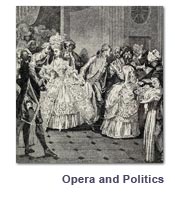Date/Time
Friday, February 27, 2009–Saturday, February 28, 2009
All Day
Location
William Andrews Clark Memorial Library
2520 Cimarron Street
—a conference organized by Olivia Bloechl, University of California, Los Angeles

This conference highlights current research on the politics of French opera, from its beginnings under the Sun King through the middle years of Louis XV’s reign. Historians of music, literature, and the performing arts have long explored the absolutist politics of opera in France, especially in relation to the tragédies en musique of Quinault and Lully. Yet historians’ understanding of the ancien régime and its politics has shifted in recent years, with many questioning the earlier emphasis on the centralizing monarchical state and drawing attention to other aspects of French governmentality and political life. Cultural historians have likewise reconsidered the earlier focus on absolutist representation, recognizing the importance of other modes of French political culture, even in royal performances. At the same time, scholars have devoted more attention to comic opera, opera-ballet, and operatic parodies, which mediated the political perspectives of a wider social register. In the early eighteenth century, French opera also became more cosmopolitan, as is clear from the popularity of operatic subjects, styles, and performers imported from Italy, the colonies, and other foreign locales. This cosmopolitanism begged the question of what precisely was “French” about French opera, a problem that became more urgent and more difficult to resolve as the century progressed. Philosophes, critics, and musical amateurs reflected extensively on such questions in the period’s many querelles, suggesting that part of opera’s attraction was as an occasion to imagine new forms of political community, in addition to its long-standing role in conserving the old.
Program
Session 1: Politics of Spectacle
Moderator: Steve Fleck, California State University, Long Beach
John S. Powell, University of Tulsa
“The Metamorphosis of Psyché (1671)”
Rose A. Pruiksma, Independent Scholar
“’Ce Héros terrible dans la Guerre: Il fait par sa vertu le bonheur de la Terre‘: Louis XIV’s Wars, Propaganda, Divertissement, and tragédie en musique”
Session 2: Politics of Religion at the Opéra
Moderator: Olivia Bloechl, University of California, Los Angeles
Charles Dill, University of Wisconsin-Madison
“Unigenitus at the Opéra”
William Weber, California State University, Long Beach
“Opera as National or Cosmopolitan in Comparative Perspective, 1750–1800”
Geoffrey Burgess, Eastman School of Music
“Enlightening Harmonies: Rameau’s corps sonore and the Voice of God”
Session 3: Politics of Representation and Reception
Moderator: William Weber, California State University, Long Beach
Olivia Bloechl, University of California, Los Angeles
“Choral Lament and the Politics of Collective Mourning”
Raphaëlle Legrand, Université de Paris Sorbonne, Paris-IV
“Political Subtext in Rameau’s Operas”
Downing A. Thomas, University of Iowa
“Taste and Politics in the Querelle des Bouffons”
Session 4: Opera in the Late Reign and Regency
Moderator: Bruce Alan Brown, USC Thornton School of Music
Don Fader, University of Alabama
“Le Régent en Bacchus? Philippe d’Orléans’s Cultural Politics and Penthée (1703)”
Georgia Cowart,Case Western Reserve University
“Campra, Watteau, and the Ideology of Fête”

